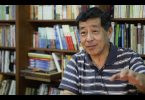
受訪人: Charles(張永新老闆書店雇員) 採訪地點:張老闆書店 採訪時間:2016年4月7日 採訪:黃孫權 王岩 影像,整理:甘志雨Can you just introduce yourself and your background?
可以介紹下您自己和您的背景嗎?
My name is Charles. I work at Gerak Budaya. I start working here about one year ago. I work as officially the international academic coordinator. But it’s a kind of potential job title. It doesn’t mean really much. I mostly do a lot of books, especially language books. I also organize events and participate in the general company.
我的名字叫查理斯,在Gerak Budaya工作。我在這工作差不多一年了,職位是國際學術協調員,但這只是個頭銜,不代表什麼。我大多數時間做書籍出版工作,特別是語言類書籍。我還組織活動,以及公司的日常工作。
您為什麼來馬來西亞?為什麼在這家左翼的書店工作?
I came to Malaysia about May 2015, or March 2015. My partner’s actually a Malaysian. We met in the university. But because of the nature of Immigration Law in the UK. We couldn’t live together. So we decided we want to move to Malaysia together. We came to here, and we came to (place name). I first found Gerak Budaya in a local bookshop. I found books about Malaysia politics and I didn’t expect to find that kind of literature in Malaysia. So I started reading and enjoy the books and so I just emailed, emailed address out of the book and then Chong came and brought me to the Gerak Budaya. He told me all about his past. He told me all about you know the politics of Gerak Budaya and what he was trying to achieve. I was really lucky that he gave me a job. I’m very grateful.
我是2015年5月來馬來西亞的,或者3月份。我的愛人是馬來西亞人,我們倆在大學裡面相識的。但是,因為英國移民法的規定,我們不能一起生活。所以我們決定來馬來西亞。來了這裡以後,我在當地一家書店的時候發現了Gerak Budaya出版的書,發現原來還有關於馬來西亞政治的書籍,我沒想到在馬來西亞可以看到這種作品。於是我開始閱讀,我很喜歡這些書,然後我就給書頁上的連絡人寫了郵件。然後張先生來找我,帶我去了Gerak Budaya書店,他還告訴我他的過去,Gerak Budaya的政治理想,他想要做的事情。我很幸運能得到他提供的這份工作,我非常感激。
您在書店的日常工作是什麼?
I mostly work on books, review books. So I focus on trying to identify the best books, the most important books you need to find. We always try to find some old books, outdate books that really relative to people’s ideas and thinking in Malaysia. We always try to find books that will, kind of, promote progressive messages, better vision of Malaysia. so a lot of time I spend on doing that.
主要是審閱書籍。我專注於鑒定好書,尋找最有價值的書。我們一直在努力尋找那些與馬來西亞人民的思想相關的老書,尋找那些宣揚進步思想、馬來西亞願景的書。我們花了很多時間在這上面。
選書的原則是什麼?
We are trying to (find) something to people’s political understanding, political activity. They are understanding to Malaysia’s place. Malaysia place, somewhere were you can’t it always rely on the official authorities. So the press to give you all these to open views about things. So you rely on the writers, the tinkers, to give you critical views of certain news and aspects. so we are trying to be voicing part. And in Malaysia you have much wide movement of people who were contributing to this. Gerak Budaya is one of the places where you got this kind of key books and literature.
主要原則是促進人民的政治理解和鼓勵參與政治活動。人們需要瞭解馬來西亞的處境,在馬來西亞,你不能總相信當局。所以媒體(需要)給你很多材料,打開眼界。然後你就要通過作家、思想家來獲得對時事的批判性看法。我們想要成為發聲的那個。在馬來西亞,很多人廣泛地參與各類政治運動,Gerak Budaya是其中的一個積極參與者,也是找到這類好書和文學作品的地方之一。
有誰尋找並決定要出版那本書?
We’ve given quite a lot control. I think every English language books, you can’t only trust your own judgment. So we choose ones we think have good message. They were mean something to people. We always have meetings and discussions. Sometimes we disagree about what is good books. Sometimes we disagree about messages. Because we receive books on so many different issues, some of them are international focus, some on just local. But in the end, we collect the decisions about what we think should to be published or not.
我們會經過很多把控。每本英文書的選擇,只靠一個人的判斷是不行的。我們選擇那些我們覺得內容好的書,對人們有意義的書。我們經常開會討論。有時會出現不同意見,因為每一本書關注的內容不一樣,有的關注國際問題,有的關注地方問題。但最後,我們會匯總各種意見,決定出版或者不出版。
張先生,他給您帶來很多靈感嗎?您剛剛說過,他給你講了自己的故事,然後您決定加入公司。您是怎麼看待他的?
He has an amazing story. You don’t always find out all about it. You sometimes find out a little bit. I think it’s an inspiring way if you being through certain past, he’s kept on going, kept on promote positive message in Malaysia, and kept trying to produce kind of company that can do that. I think it’s very important to that carries on.
他有很多傳奇的故事。你不會一下子全部瞭解,你會時不時的聽到一點。我覺得他的堅持是很激勵人的,在有這麼多過往經歷的情況下,他仍然堅持理想,堅持在馬來西亞提供和促進進步的訊息,堅持做這個能提供這種訊息的公司。我覺得繼續做下去很重要。
在英國有很多這樣的獨立左翼書店嗎?
Yes, you’ll find them, but not so much. I mean there are still some important ones in certain cities but they are mainly focused on London. When you find them, some of them is doing very well; some of them is being struggling. But if you go to a normal bookstore, you will not find any radical books, you will not find any critical books. You’ll find normal kind of standard books. What interested me when I came to Malaysia is that if you go to the normal bookstores, all of the books you can go and find like critical and political literature. You could read about politics about Malaysia. You could learn something. And then you will find about something like Gerak Budaya, and it’s very very confusing way, because there are lots of countries that still have a lot of radical publishers who survive and who continually put out really good books, some really important books. And here in Malaysia you have this small publisher who is just been doing for now kind of 15 years, and who is successful doing and how to following, and producing books were really important. Malaysia would be Malaysia if don’t have these books published. So I think, yeah, in the UK, you do have big scene for these kind of books but it’s definitely not mainstream. Where’s here, kind of still influence the mainstream, still try to promote these message amongst normal Malaysia.
有,你能找到這樣的書店,但不是很多,主要集中在倫敦。他們有的做的很好,有的差一些。但是如果是普通書店的話,那裡沒有激進類的書,也沒有批判類的書,你只能看到普通的、標準的書。來到馬來西亞後,令我很感興趣的是你走進一家普通書店,也可以找到批判類政治類的文學作品,你可以閱讀馬來西亞政治,能學到一些東西。然後當你去了Gerak Budaya書店,你看到的東西完全顛覆你的過往觀念,你會感到迷惑,奇怪怎麼在這個國家裡還有這麼多的激進出版社存活,還在不斷地出版這麼好的書,這麼重要的書。在馬來西亞,有這樣一個小出版商,迄今為止他已經做了15年,做得很成功,知道如何進步,出版了非常重要的書籍。如果沒有這些書籍,馬來西亞就不是馬來西亞。我認為在英國,雖然不乏這類書籍,但是它絕非主流。在這裡,這些書籍影響著主流,努力向馬來西亞普通百姓傳播進步資訊。
真的嗎?在這裡屬於主流嗎?
At least likely. For example, in the newspapers that many people would read. All books will be reviewed. They might be discussed. It was not always easy but still some connection, whereas, for example in the UK, the kind of radical publishers, even like for example VERSO, their books might not be appreciated by, often, the mainstream papers. There’re kind of… there are still some sense which there are on the ground. I just got that opinion. But I can go around in the UK the whole way like city center or something without seeing any interesting books. Here, there’re always something going on. It might be stuff but something about the publishers which people interested in and people want to listen to. I think important because there’s no kind of middle of the road political publisher here. There’s not whole if you writing about politics, you probably write it in an interesting way and informality way, and here probably in a radical because it’s not whole boring load of political books just middle class of people want to read. Actually if you write things about politics, you probably say something interesting and it probably means that people are going to be interested in what you have to say.
至少看起來是這樣的。比如,在馬來西亞,這種激進書籍會上主流報紙,很多人會讀。所有的書籍會被審查,被討論。有時候這很不容易,但總是跟社會有著聯繫。在英國,這種激進出版商,甚至是像Verso這樣的出版社,他們的書可能並不常常受主流報紙的歡迎。當然在市面上會見到一些,但我感覺,我在英國的市中心或其他地方逛一天,可能也找不到任何有意思的書。而在這裡,總有有意思的事情,可能是關於出版人自己的故事,這是人們願意聽到,想要聽到的。我覺得這也很重要,因為政治書籍出版家不是中庸(中間路線)的,如果要寫政治,就要用一種有趣的、非正式的方式來寫作。在這裡,也可能用激進的方式寫作,因為人們想看到的不僅僅是那些無聊的政治笑話。實際上,如果你要寫點兒什麼關於政治的東西,你多半要講一些有意思的事,或者至少要讓人們對你說的東西感興趣。
這聽起來有點兒奇怪,因為,我們都知道,在英國,你們是自由的,自由言論,自由寫作。所以您說的是,人們並不總是對這種東西感興趣,或者甚至不會去討論這種東西?
Because I mean the idea of having book of critic of your life for example. In some of the societies is not so popular, it may be sitting down there for free peeking. But if you are own start of life, past, history of societies, it means critic think you are in the pack of the global scene, this kind of thing. Most European people nowadays quite middle class, quite happy to be self-satisfied of their life, they are not looking to that kind of radically challenge, the system. Of course there’re tons of radical people but they are actually sparsely people asking especially critical questions because they are often relatively comfortable and they have certainly interest in not changing things too much. In a country like Malaysia. I think people have to consider all the alternatives what can you do. So I think the certain way that drives asking critical questions like looking for different perspectives in the way that in the UK, not necessarily. UK is a country of nearly like some 10 million people, and of course how’s radical publishers, how’s aggressive publishers. But it’s no great to, example, here. As a population, I don’t know if there is anymore significant. I think sometimes I…sometimes English societies, does it great in freedom? But people don’t use that freedom. They use that freedom to set back, relax too much. I think people here with kind of positive stuff have been force actually write and think and act in a way some people don’t have to.
因為,比方說一本批判生活的書,在有的社會當中就不太流行,很可能無人問津。但如果你想要瞭解生活的起源,社會的過去,歷史,它可以帶來在全球視野中的批判性思維,這種東西。現在大多數歐洲人,是生活相對富足的中產階級,滿足於現狀,不會對那種激進的挑戰式的東西感興趣。當然,激進的人很多,但真正提出批判性問題的人很少,因為他們往往滿足於現狀,不想過大地改變現狀。在馬來西亞這樣的國家,人們不得不去考慮所有的選擇,所以我覺得在這裡適用的那些批判性問題,可能在英國就提不出來。英國有將近1000萬人口,裡面當然會有激進出版家,進步人士。但比起這裡,肯定要少。至少從人口的角度來看是這樣。我覺得有時候……有時候英國社會,它是不是自由呢?是的,但人們並不完全地利用那種自由,他們躺在自由上止步不前,舒適而懈怠。我想在這裡(馬來西亞)的進步人士是不得不去那樣寫作、思考和行動,但別處的人卻犯不著那樣。
您認為和張先生共事困難嗎?
Mostly, it’s very fun. Every day is a challenge. We come from very different places. Sometimes we have very different understandings of things. But he is usually very open-mined to different ways to doing things. He likes different ideas. He is not always gonna get in his ways. He is not conceptive personality. So he is always looking for something to be done differently or ideas to be challenged. So that’s interesting.
大多數時候,挺有趣的。每天都是挑戰。我們都來自不同的地方,有時候對事物的理解很不一樣。他喜歡各種不同的思想,並不總是堅持要用自己的方式。他的個性並不迂腐保守。他總是在嘗試用不同的方式來解決問題,或者挑戰新的思想。挺有趣的。
那麼,在您為他找書的時候,最後如果你們的意見不一致,他會不會堅持到最後,決定用不用那本書?
Yes, sometimes I think, but we have rare argument, and we have free speech completely. So we can be very honest, sometime he has different perspectives on something. obviously he has been here for so much longer he has much stronger grass sometimes Malaysia public grounds but also the importance of certain books, historical of Malaysia, like Office Being Struggle, He knows the importance of this book to certain fields, to certain people, in a way that if you just come to this country, you might not. So sometimes he would put down and says this should be published.
有時候是這樣的,我想,因為我們之間爭論並不多,而且我們的言論是自由的,所以我們十分誠懇地(提出意見),有時候他跟我們有不同的看法。當然了,他在這裡這麼長時間,對馬來西亞的瞭解很深刻,基礎也很深厚,他知道哪本書,比如《Office Being Struggle》這本書,對特定受眾、特定領域的重要性,而如果你剛來,可能就不知道了。所以有時候他會堅持己見,說這本書應該出版。
我們早先跟張先生聊過,他挺難過的,說找不到誰願意繼承他的事業,您對此怎麼看?
I think it becomes harder and harder because I think increasingly you have people who were looking for, looking for more material gain, looking for jobs in industries which are renowned, like lawyer, doctor, that kind of thing. Running this kind of company is going to be a risk because it’s a kind of place you have to survive continuously based on a smallish group of people who always support you. And something you do would be success, but a lot of academic books you publish, we publish, because they won’t do really really well do a lot of copies but really important to publish in themselves, and the nature of this kind of publisher is that you take risks and you are going to, sometimes, make tons of losses. You have to be ready to know, you are not gonna make a lot of money and selling kind of left wing, progressive books. so it’s not an attractive proposition for lots of young people nowadays. But actually there are also lots of people in Malaysia who doing their own things. There are a lot of people setting their own magazines, their own small bookstore. I think increasingly people want to be doing their own thing, they have their own ideas about what things should be done. so I think find it not to find lots of people want to take this job. There are a lot of people who in this kind of arena, who are trying to do some of the things. so I think progressive books would carry on no matter what… it might be hard to find people who want take a huge company and say we want all the responsibility because there’s probably quite scary.
我覺得確實越來越難,因為,人們現在更願意去得到物質上的回報,想要一些體面的工作,比如律師、醫生等等。運營這樣的一家公司是有風險的,因為在這一行,你必須依靠不斷支援你的小部分人來維持生存,有時候有的書會成功,但大多數的書,我們出版的書,不會賣得特別好,雖然出版它們本身非常重要。這種形式的出版工作中,要承擔很多風險,有時候會有很多損失。你必須要知道,你不可能通過賣左翼的進步書籍大富大貴,所以這對很多人來說就沒什麼吸引力了。不過,實際上,馬來西亞現在很多人都在尋找自己的生存方式,很多人成立了自己的雜誌,自己的書店。我想還會有更多的人願意自己按照自己的意願去生存,有自己的想法。所以我覺得確實很難會有很多人願意接手這個工作。這個領域還有很多人,他們都想做出一定的成績,所以我相信,進步書籍還是會繼續發展下去的,無論如何……雖然,可能很難再找到這樣一個人,站出來接手一家大型公司,說這個任務就交給我吧,這樣其實挺嚇人的。
Nine女士告訴我們說,她和一些年輕的小雜誌社合作,出一些地下雜誌,您知道嗎?(是的)那麼,您對此怎麼看?這些年輕的一代,想要聚到一起做些事情,和這裡的還不太一樣,但總體來說都是,左翼的,是吧?所以,想請教下您的想法…
I think mainly what we do is…… We’re still go through this kind of establish channels. We’re still go through book stores and newspapers this kind of thing. I think from what I’ve seen, there is a whole youth movement, which is kind of rejecting, that kind of thing. They don’t go through bookstores. They don’t rely on corporations. They don’t rely on like media organizations to do that job for them. They are utilizing social media. They are really good at finding their own people to write things. They have like very low production cost because they do things on the very kind of simple bases. But they are really able to spread messages among other young people. And you find like in these stuff, Nine’s involved in, but you also find other small publishers who publishing simple small books, trying to promote messages which spread on the community very quickly, and in Malaysia you have different racial communities, different language communities, so sometimes if you just be in English, you are only speaking to a certain kind of maybe like urban middle class who to appreciate your books. But as a huge, like Malay speaking population in the rest of the country. We also receipt these ideas, receipt these books. If you can do them in a very cheap, accessible way. There are really interested them as well. So this is the whole kind of Malay speaking or Malay language press which is developing and they produce really cool stuff. I really sad that I don’t speak Malay because I can’t appreciate it. But those things are really radical really cool. That’s the kind of future. That’s the way things moving. That’s really good.
我想,我們主要做的是…我們仍然在堅持著這樣的一些管道,我們仍然去逛書店,看報紙。就我所知,現在有一場全是年輕人主導的運動,他們拒絕這樣,拒絕去書店,也不依靠大公司。他們不依賴媒體,他們利用社交媒體。他們很善於找到自己需要的寫手,善於用很低的成本是做出來,因為他們的底子也很簡單。他們確實能夠在年輕人當中傳播訊息,這其中,Nine也加入在裡面了。不過,我們還要看到,這些小出版家們,出版一些簡單的書籍,想要在全社會當中快速傳播。在馬來西亞,有各種不同的種族群體,不同的語言群體,所以如果你只是出英文書,你的受眾只能社會的特定人群,比如城市中產階級,只有他們能讀。但其實還有大量的馬來人,講馬來語,我們也接受馬來語的思想和書籍。人們對此很感興趣。所以,還有一些講馬來語的出版商或者馬來語出版社,他們在發展,出版很多很有意思的東西。我不會講馬來語,挺慘的,我沒辦法品讀那些東西。但那些出版物真的很酷。這是一種未來,這是前進的方向。這樣很好。
人們常來這樣的書店嗎?
Yes, people are advance so they came here buy books. I mean, this is a connection. They rely on some of the things you publish, because, you know, it is important to them, but they have their own way of doing things. They have their own ideas about how things should be done. And I think you know, inside the books, knowledge and stuff, it gives you the power to be able to realize your own project, so you don’t have to rely on certain things anymore. You could do things yourselves. I think people are realizing that.
是的,進步人士常來這兒買書,這是一種聯繫。他們依賴你出版的東西,這對他們很重要。不過,他們也有自己的處事方式,有自己的想法,知道該怎麼做。我認為,書籍中間的知識和智慧,能夠讓你有能力去意識到自己想做的事業,所以你就不會再繼續依賴某些東西,而能夠有自己的智慧。我覺得人們在逐漸認識到這些。
非常感謝!
You are welcome.
不客氣。


 微信扫一扫,打赏作者吧~
微信扫一扫,打赏作者吧~



Leave a Comment